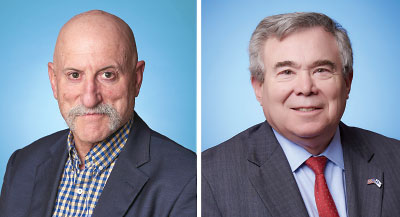Geller Chosen APA’s Next President-Elect
Abstract
APA members have selected a leader in community psychiatry and an educator who has served APA in many capacities over the years.

Jeffrey Geller, M.D., M.P.H. (left), will become president-elect of APA at the end of APA’s Annual Meeting in May, when Bruce J. Schwartz, M.D., becomes president.
APA’s voting members have elected Jeffrey Geller, M.D., M.P.H., of Worcester, Mass., to become APA’s next president-elect. He ran against Theresa Miskimen, M.D., of Piscataway, N.J.
Geller’s election represents APA’s return to its historic roots as he is the second superintendent or medical director of what started out as the Worcester Lunatic Asylum. The first APA president from that institution was one of APA’s founders and its first president—Samuel B. Woodward.
Geller is medical director of the Worcester Recovery Center and Hospital, Massachusetts’ largest state hospital at 290 beds. He is also a professor of psychiatry at the University of Massachusetts Medical School. He has served in numerous APA leadership positions, including Area 1 trustee and vice president of APA; member of the Committee on Psychiatric Diagnosis and Assessment, the Council on Global Psychiatry (which he once chaired), and the Council on Advocacy and Public Policy; and book review editor and column editor for Psychiatric Services.
Geller is currently a member of the APA Foundation Library and Archives Advisory Committee and the APA 175th Anniversary Advisory Committee. A longstanding member of the APA Assembly, he is the recipient of its Profiles in Courage Award and the Ronald A. Shellow Award. Among other APA awards he has received are the Human Rights Award and Arnold L. van Ameringen Award for Psychosocial Rehabilitation.
He serves on the boards of the American Association of Community Psychiatrists, Clubhouse International, and Treatment Advocacy Center and is vice president of the World Federation for Mental Health.
“I am honored that my colleagues have chosen me to help lead our medical society,” Geller said. “I plan to focus on improving the profession, partly by easing the administrative, documentation, and certification burdens placed on our members as they work to deliver high-quality care and treatment to our patients. I will also advocate for enforcement of equal coverage of mental illnesses as mandated by law and combat the terribly harmful discrimination against both psychiatric patients and psychiatrists. One more year of marginalization is 12 months too many.”
Among Geller’s priorities as APA president, when he assumes that role in May 2020, are supporting psychiatrists through improving their professional lives, such as addressing maintenance of certification issues and compensation. During his campaign, Geller expressed a desire to work more effectively to address the fragmentation of psychiatric services that have led to prolonged emergency department boarding and jails and prisons populated with individuals who need psychiatric treatment, not incarceration; integrate psychiatry with other fields of medicine; address the disparities between person-centered care and the need for treatment; improve health insurance benefits for psychiatric treatment; and advance the quest for people with serious mental illness to be full members of their chosen communities.
Other Race Results
The race for secretary, which has a two-year term, was up for election this cycle. Sandra DeJong, M.D., M.Sc., of Needham Heights, Mass., defeated Jeffrey Akaka, M.D., of Honolulu and Ramaswamy Viswanathan, M.D., D.M.Sc., of Brooklyn, N.Y.
In the race for minority/underrepresented trustee, Rahn Kennedy Bailey, M.D., of League City, Texas, emerged the winner. His opponent was Robert Cabaj, M.D., of San Francisco. This position has a three-year term.
Two of APA’s seven geographic Areas voted for a trustee in this election cycle. Only members within each Area could vote for their respective Area trustee. Area trustees hold three-year terms.
Winning the Area 3 trustee race was Kenneth Certa, M.D., of Philadelphia. His opponents were Barry Herman, M.D., M.M.M., also of Philadelphia and Roger Peele, M.D., of Rockville, Md.
Melinda Young, M.D., of Lafayette, Calif., was elected Area 6 trustee. Her opponent was Barbara Weissman, M.D., of San Mateo, Calif.
The winner of the race for resident-fellow member trustee was Michael Mensah, M.D., M.P.H., a PGY-2 resident at the UCLA David Geffen School of Medicine/UCLA Medical Center Program. His opponents were Lisa Harding, M.D., a PGY-3 resident at the University of Kansas School of Medicine-Wichita, and Daniel Hart, M.D., a PGY-3 resident at Walter Reed National Military Medical Center.
Election results were approved by the Tellers Committee in February, but the results will not be official until after the Board of Trustees reviews them at its meeting this month. All of the winning candidates will assume their positions on the Board at the close of APA’s Annual Meeting in May. ■



